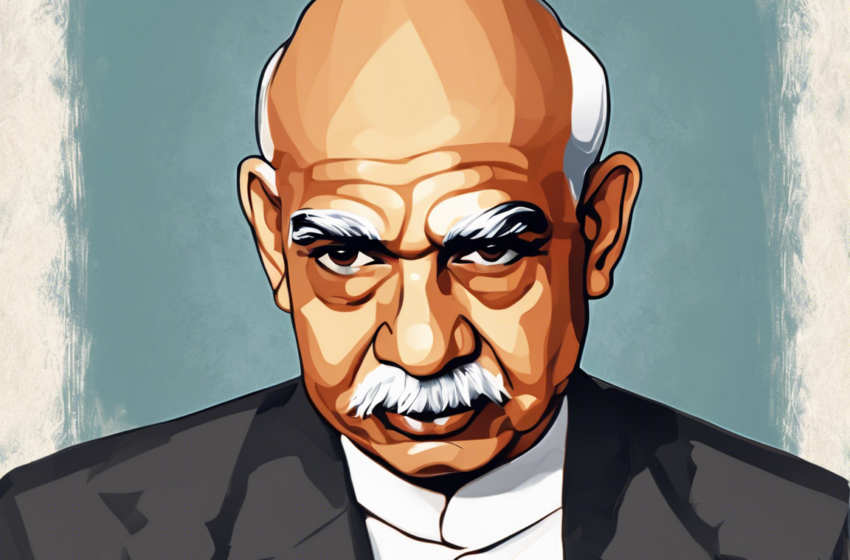The Legacy of Chaudhary Charan Singh: A Political Pioneer

Introduction
Chaudhary Charan Singh was an esteemed political leader and a farmer’s champion in India. Popularly known as the ‘Champion of the Indian Peasantry,’ his legacy continues to inspire many to this day. From his humble beginnings to becoming the Prime Minister of India, Chaudhary Charan Singh’s journey is a testament to his grit, determination, and deep-rooted commitment to serving the farmers and the common man. This blog post delves into the life, contributions, and lasting impact of this political pioneer.
Early Life and Political Career
Born on December 23, 1902, in a small village in Uttar Pradesh, Chaudhary Charan Singh’s early life was marked by simplicity and hard work. His upbringing in a farming family instilled in him a profound understanding of the struggles faced by the agrarian community. This upbringing would shape his political ideology and define his future endeavors.
Charan Singh’s entry into politics was driven by a desire to uplift the marginalized and empower the farming community. He began his political career in the 1930s, actively participating in the freedom struggle and advocating for the rights of farmers. His relentless efforts to address the issues of land reform, agricultural policies, and rural development propelled him into positions of leadership within the political landscape.
Land Reforms and Farmer Empowerment
One of Chaudhary Charan Singh’s most significant contributions was in the realm of land reforms. As the Chief Minister of Uttar Pradesh, he introduced various policies aimed at redistributing land to landless farmers and ensuring fair treatment for tenants. His efforts to challenge the prevailing feudal system and empower the farming community earned him the title of “champion of the farmers.”
Under his leadership, the implementation of land ceilings and tenancy reforms brought about a significant shift in landownership patterns, benefitting numerous small and marginal farmers. He firmly believed that access to land was crucial for economic independence and social equality, and he worked tirelessly to realize this vision.
Political Leadership and Advocacy
Chaudhary Charan Singh’s tenure as the Prime Minister of India was marked by a steadfast commitment to upholding the rights of farmers and the downtrodden. Despite facing numerous challenges and political opposition, he remained resolute in his dedication to serving the interests of the common man. His policies aimed at improving agricultural productivity, ensuring fair prices for agricultural produce, and safeguarding the welfare of farmers resonated deeply with the masses.
His advocacy for rural development, social justice, and empowerment of the underprivileged sections of society left an indelible mark on Indian politics. Chaudhary Charan Singh’s principles of honesty, integrity, and unwavering dedication to public service continue to inspire politicians and citizens alike.
Legacy and Impact
Chaudhary Charan Singh’s legacy endures as a beacon of hope for the farming community and all those striving for social justice and economic equality. His emphasis on grassroots democracy, agrarian reforms, and inclusive development laid the foundation for a more equitable society. The agricultural policies and welfare schemes he championed continue to shape the discourse on rural empowerment and agricultural sustainability.
His teachings on self-reliance, community support, and standing up against injustice remain relevant in today’s context. The spirit of Chaudhary Charan Singh lives on in the hearts of those who continue to fight for the rights of farmers and the marginalized sections of society. His legacy serves as a reminder of the power of political leadership rooted in empathy, integrity, and a deep-seated commitment to serving the people.
Frequently Asked Questions (FAQs)
- What were Chaudhary Charan Singh’s key achievements as a political leader?
-
Chaudhary Charan Singh was instrumental in championing land reforms, agricultural policies, and rural development initiatives that aimed to empower farmers and uplift the marginalized sections of society.
-
How did Chaudhary Charan Singh contribute to the welfare of farmers in India?
-
Through policies focused on land redistribution, tenancy reforms, and fair pricing for agricultural produce, Chaudhary Charan Singh worked to improve the livelihoods of farmers and ensure their economic independence.
-
What was Chaudhary Charan Singh’s ideology as a political leader?
-
Chaudhary Charan Singh believed in grassroots democracy, social justice, and inclusive development. His political ideology was centered around empowering the common man and advocating for the rights of the underprivileged.
-
What is the significance of Chaudhary Charan Singh’s legacy in contemporary Indian politics?
-
Chaudhary Charan Singh’s legacy continues to inspire political leaders and activists to prioritize the needs of farmers, promote agrarian reforms, and work towards creating a more equitable society.
-
How did Chaudhary Charan Singh’s background influence his political career?
- Coming from a farming family, Chaudhary Charan Singh’s upbringing gave him a deep understanding of the challenges faced by the agrarian community, shaping his political journey focused on advocating for farmer empowerment and rural development.